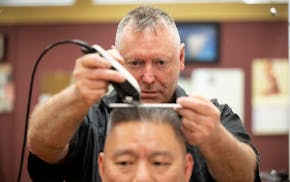Crystal Hill-Hover, a one-time drug offender and recovering addict, has turned that unfortunate experience into a promising business enterprise.
Under a pilot program, Hill-Hover, 40, is one of only a few former offenders in Minnesota approved for a business loan guaranteed by the U.S. Small Business Administration (SBA).
Mentor Paul Kustermann, a one-time police and corrections officer who has spent years working in the addiction recovery field, also is an investor in Hill-Hover's Twin Cities Wellness Center & Recovery Gym.
Kustermann, a former part-owner and manager of Restoration Counseling & Community Services (RCCS) in north Minneapolis, helped her plan her business.
"Crystal was dropped off at RCCS by a Minnesota Department of Corrections van with a box of her possessions," Kustermann recalled. "Her drive was evident. She was a standout. Committed to recovery and lifestyle changes."
Hill-Hover advanced to sober housing within five months, and inspired others, he said.
"She has a big heart," Kustermann said. "She was someone I could get behind after she was a client."
Hill-Hover's entrepreneurial vision was to develop, eventually, her own wholistic treatment facility that provides physical, spiritual and emotional support, as well as assistance through partner agencies and nonprofits with housing and employment services.
The fact that Kustermann and two other investors put up more than $120,000 to help launch Twin Cities Wellness Center last year impressed bankers at Alerus bank, which secured a $210,000 working capital loan earlier this month.
Angela Kazmierski, Hill-Hover's SBA credit manager at Alerus bank, and Julie Stewart, Alerus commercial lender, said Hill-Hover was open, tenacious and demonstrated character, on top of a credible business plan.
"Crystal is the rare borrower with a criminal background," Stewart said of Hill-Hover's two felony convictions and 16 arrests.
"However, she made us a believer with her effort and determination," she said. "And people on our team saw that this could work. Crystal did what was needed to get this over the finish line."
Twin Cities Wellness Center in June achieved profitability on $90,000 in revenue. The loan proceeds will help expand the in-demand facility from 32 to 48 clients by fall.
Hill-Hover was a good student who dropped out of high school in Ohio. She had started using and selling marijuana. She eventually followed her mother into using and selling methamphetamine. Long-term use of meth is highly addictive and can result in psychological and physical deterioration. And death.
Hill-Hover moved in 2000 to the Twin Cities, near her grandparents. She had worked for a pizza chain in Ohio and took a store-management job with the company here. However, she couldn't kick her addiction or financing it with drug sales.
She started to turn her life around in 2015, during a second stint at the Minnesota women's prison at Shakopee. Hill-Hover also had a son. A third drug conviction would mean federal prison and loss of custody.
Hill-Hover completed a recovery program and a strenuous "boot camp" program of physical training and personal development. She also earned a high school equivalency degree and MBA in business. Hill-Hover had a plan. And the fortitude to execute it.
She stayed close to Kustermann, 63, who spent 10 years in the Army before getting into policing, prison work, then community-based recovery. He increasingly saw many prisoners' problems rooted in disadvantaged childhoods, dysfunctional homes, school struggles and chemical dependency.
Hill-Hover envisioned with Kustermann her own recovery center and health business.
"Paul is kind of the dad and mentor I never had," Hill-Hover recalled. "My dad died of alcoholism when I was 15. I have nothing but love and respect for him. And he's been there for me since the RCCS recovery program.''
Hill-Hover said her business works because it is client-focused, customizes treatment with comprehensive assessment and tracks progress. Most of Twin Cities Wellness Center clients are ex-convicts. The atmosphere is professional but supportive and casual.
"They know they are surrounded by people who have been in their shoes," Hill-Hover said.
Twin Cities Wellness Center's revenue comes from private insurance, Medicaid or other government assistance, patient payment and families. It can cost $100,000 over a year or more, depending on services. But it is cheaper than cycling through prison for years.
"Crystal has positively modeled and influenced hundreds of people over the last several years," Kustermann said. "This stuff helps repair and restore people."

St. Anthony: 'Patient' investing paying off for St. Paul's Hill Capital

Jennifer Smith, leader of Burnsville's Innovative Office Solutions, has died

St. Anthony: Medical professions in Minnesota need more people of color in their ranks


